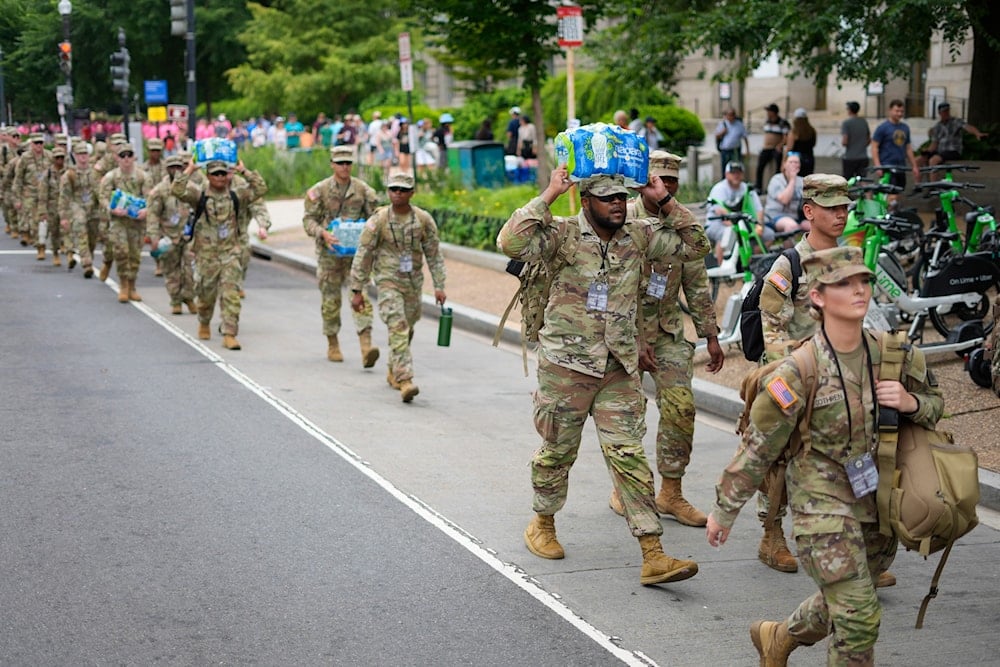US army hijacks social media to recruit Gen Z amid Gaza bloodshed
The US army is paying lifestyle influencers to glamorize enlistment, masking Washington’s wars abroad and exploiting Gen Z’s search for stability.
-

US Army soliders walking along Constitution Ave., on the National Mall ahead of a parade commemorating the Army's 250th annversary and coninciding with President Donald Trump's 79th birthday, Saturday, June 14, 2025, in Washington (AP)
Last month, fitness influencer Steven Kelly, who boasts 1.3 million followers, posted a carousel of Instagram photos showing him in combat fatigues, scaling a rope wall, and aiming a firearm. Kelly is not enlisted in any military branch. The post, however, was sponsored by the US Army.
“This experience showed me how the Army builds readiness, resilience, and discipline,” the caption read, directing followers to a recruitment link.
View this post on Instagram
Per The Guardian, Kelly is one of a growing number of lifestyle influencers contracted by the US army to produce sponsored content targeting Gen Z audiences, many of whom have little direct exposure to military life. Among those recruited are a chef, a travel vlogger, and an extreme sports creator.
“These partnerships increase the army’s visibility, bring awareness to untapped audiences, and articulate the possibilities of army service in unique and creative ways,” said Madison Bonzo, a US army recruiting spokesperson.
The strategy underscores how Washington has moved beyond marketing products, using social media to promote careers and lifestyles, while masking the reality that enlistment means years of service under an institution waging wars abroad.
Marketing war during Gaza atrocities
The US army’s influencer campaign comes at a moment of mounting anger over Washington’s unconditional military support for “Israel’s” genocide in Gaza. A recent Gallup poll found fewer than a third of US adults back “Israel’s” military actions, as reports continue to expose mass hunger and aid restrictions enforced by the occupation.
Some social media users slammed Kelly’s post as “propaganda". One wrote: “The rich influencing the poor to do the things that they don’t want to. Its giving Hunger Games. Its giving Class Wars.”
Robert Kozinets, a professor at the University of Southern California, told The Guardian the posts resemble standard advertising. “We’re pretty used to celebrities or personalities who are endorsing particular products, even if they don’t use them themselves,” he said. “You don’t have to live at Disneyland to do a review of Disneyland.”
Selling adventure, sanitizing war
While military influencers are not new, often sharing humorous or blunt accounts of service life on TikTok, the US Army’s new partnerships with lifestyle creators present a carefully polished image. In one campaign, slacklining influencer Breannah Yeh posted a video of a tandem skydive with army personnel. “Challenges are what let us grow,” an army captain says before her jump.
“That was so epic. I do feel pretty incredible,” Yeh says after landing under an army-branded parachute, the video closing with the army slogan: “Be all you can be.”
Bonzo claimed the aim was to make service appealing, as he said, “By participating in immersive army experiences alongside real soldiers, these influencers provide firsthand insights into military life and the possibilities of army service.”
As The Guardian notes, these “insights” are choreographed spectacles, designed to package enlistment as an adventure while concealing the violence of US militarism.
Recruitment numbers and political spin
The army’s influencer push follows years of falling short on recruitment goals, particularly after the pandemic disrupted ROTC pipelines and limited young people’s exposure to the military. Katherine Kuzminski of the Center for a New American Security explained, “Accessing this entire generation of young adults who were in transition became challenging.”
But numbers have recently improved. In June 2024, the Army announced it had already met its annual recruitment goal of 61,000 soldiers, four months ahead of schedule. US President Donald Trump, during a trip to Riyadh just before Memorial Day, boasted that enlistments were “the highest in 30 years” due to “an incredible spirit in the United States of America.”
Exploiting instability
For Jess Rauchberg, assistant professor at Seton Hall University, the influencer strategy reflects the army’s exploitation of a generation battered by precarity. Reviewing posts for The Guardian, Rauchberg said they projected a promise of security at a time of economic and political turbulence.
“The military is capitalizing on this moment to say, ‘Well, our numbers are down and Gen Z is hurting for jobs and stable lives,’” she explained, adding that partnering with creators is a way to “promise them this idea of stability – if you work for us, we will take care of you.”
“That’s appealing to a lot of young people,” Rauchberg added, even as the US army continues to bankroll wars and occupations abroad.

 4 Min Read
4 Min Read










